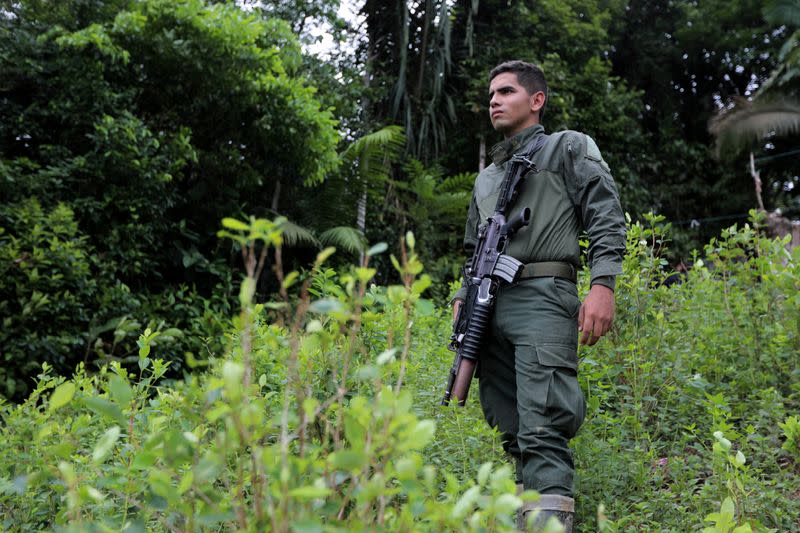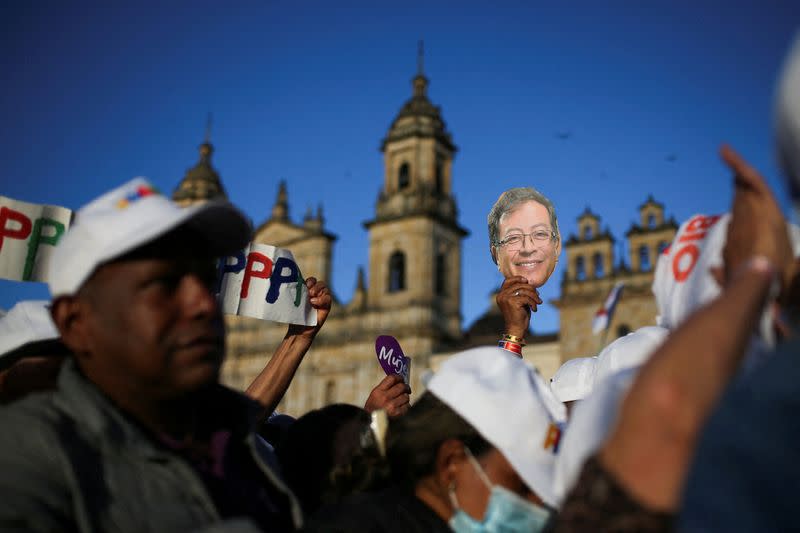Analysis: Left-wing Colombian candidate plans drug war shakeup
- Oops!Something went wrong.Please try again later.
By Carlos Vargas
BOGOTA (Reuters) - Leading Colombian presidential candidate Gustavo Petro is roundly critical of the U.S.-led war on drugs and has questioned the extradition of a drug kingpin, views that may herald a shakeup of how the Andean nation battles the narcotics industry.
Petro points out that despite billions of dollars in security spending and decades of U.S. pressure to reduce drug production, Colombia remains a top global supplier of cocaine and the site of bloody drug violence.
A left-wing senator who was once the mayor of Bogota, Petro has about 40% support ahead of the May 29 election. He is expected to face a runoff vote.
Petro decried the extradition this month of the accused leader of the Clan del Golfo cartel, Dairo Antonio Usuga. He also more broadly questions the effectiveness of extradition, a legal tool Washington considers a powerful deterrent to crime.
"Extradition: it merits a discussion - a review of the figures - to see if what's been done for 40 years has worked or not; if a million dead Latin Americans - the majority Colombians and Mexicans - has been worth it," the candidate told Semana magazine this month.
Petro, a former member of the M-19 guerrilla organization, has said no accused criminals should be extradited until they confess to their victims. He alleges that Colombia's current authorities rushed the departure of Usuga, widely known as Otoniel, to avoid embarrassing revelations ahead of the election.
"Alias Otoniel wanted to say which generals in the police, in the military, which senators, which representatives, which governors, which ministers, which presidents had been allied with him," Petro told a rally in the agricultural city of Fusagasuga.
Before his extradition, Otoniel's lawyers argued he should be allowed to testify to a transitional justice tribunal and reveal links between the military and armed groups.
President Ivan Duque has promised Otoniel will be returned to Colombia to face further charges after serving time in the United States. The Interior Ministry did not respond to a request for comment on Petro's allegations.
Current policies have failed to lower Colombia's cocaine output. Between 2010 and 2020, the most recent year for which figures are available, potential production more than tripled to 1,010 metric tonnes, U.S. government data shows.
GREEN DRUG POLICY
If his third presidential bid is successful, Petro has said his priority for the bilateral relationship will be fighting climate change and that his administration will frame drug policy around the environment.
He opposes restarting aerial spraying of coca, the plant used to make cocaine, with the herbicide glyphosate and wants to substitute coca crops with legal marijuana.
Petro will likely face right-wing candidate Federico Gutierrez in a second round, which will take place if no candidate gets more than 50% of the vote on May 29.
Gutierrez, who has around 25% support, would present fewer challenges to the status quo. He does not oppose glyphosate spraying and backed Otoniel's extradition.
He will coordinate with Washington to create a victims commission if he wins, Gutierrez told Colombian media in May, although he has also urged unspecified modifications to the bilateral relationship.
Petro might find common ground with the administration of U.S. President Joe Biden on crop substitution as well as implementation of the country's 2016 peace deal with the FARC rebels, Oliver Kaplan, associate professor at the University of Denver's Josef Korbel School of International Studies said.
In a sign Petro may be moderating some of his more strident policies as the election draws closer, the candidate has softened language around proposals to renegotiate free trade agreements, including a 2012 deal with the United States, in order to boost domestic agriculture.
Petro has also proposed the gradual elimination of tariffs on fertilizers, while levying them on food imports.
Senator Roy Barreras, a Petro ally, told a Colombian-American Chamber of Commerce event in April Petro is seeking "not a renegotiation, but a rethink" of free trade agreements.
'RADICAL TURN'
The Justice Department would take a dim view of a ban on extradition, Kaplan said, though it remains to be seen how Petro's objections may be translated into policy.
The prospect of potentially lengthy sentences far from home has long been one of the main weapons in the bilateral arsenal for fighting drug trafficking.
Washington sees extradition as a way to guarantee prosecution of criminals who might escape justice in their own countries through corruption. Colombian traffickers have historically hated extradition and mounted an out-and-out assault in protest of it in the late 1980s.
"A radical turn" in the approach to these issues could limit U.S. funding for the anti-drug fight and affect the general sense of security in Colombia, said Carolina Urrego, political science professor at Los Andes University.
The U.S. is already negotiating thorny diplomacy with once reliable partners Mexico and Brazil.
Anti-narcotics efforts have seen a shake up in Mexico, where President Andres Manuel Lopez Obrador last year closed an elite unit working hand-in-hand with the U.S.
The Justice Department declined to comment about Petro's extradition proposals and whether they would put at risk bilateral cooperation. The State Department did not respond.
U.S. Ambassador to Colombia Philip Goldberg said Washington would work with whoever won the election.
"We intend to maintain a strategic relationship with Colombia, it is very important for both countries, for the economies of both countries, for the security of both countries," Goldberg recently told journalists. He declined to discuss specific proposals.
(Reporting by Carlos Vargas, additional reporting by Julia Symmes Cobb and Nelson Bocanegra; Writing by Julia Symmes Cobb and Oliver Griffin; Editing by Frank Jack Daniel)





